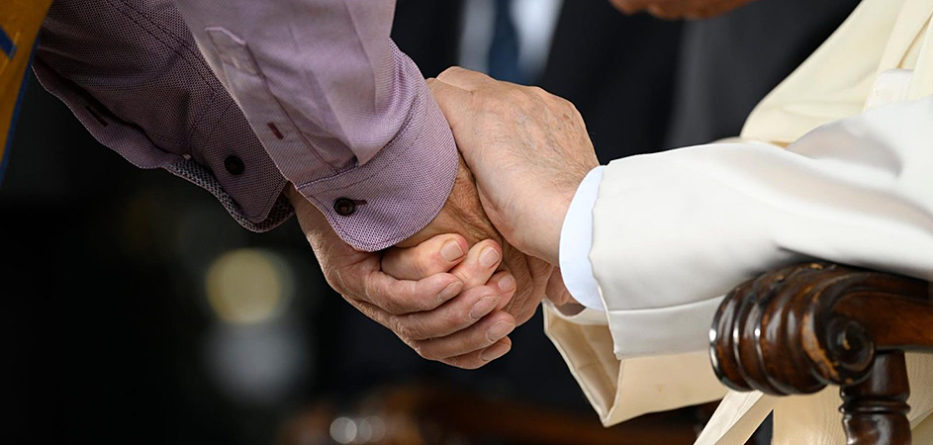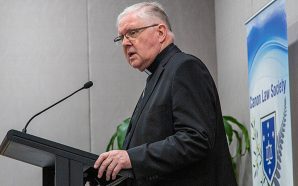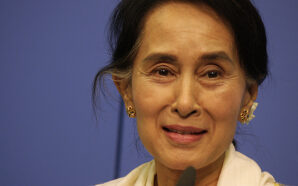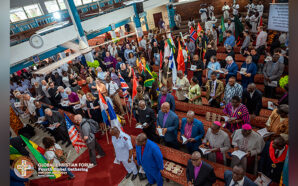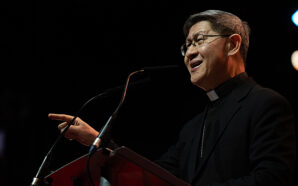An Australian priest draws parallels with the residential schools in Canada and Australia’s stolen children and insists what was perpetrated was, and remains, totally inconsistent with the teachings of Christ
A penitential pilgrimage to Canada where Pope Francis apologises to Canadian Indigenous peoples for the abuse by Catholic institutions towards children, specifically the discovery in Kamloops of 215 unmarked graves of Aboriginal children on the grounds of a residential school.
“The sky is low, there is a soft rain, and the light is blindingly white this morning in Maskwacis, a reservation about 70 kilometres south of Edmonton, Alberta.
An old man dressed in white is quietly pushed forward in a wheelchair, surrounded by other men wearing feathered headdresses. He has just paid his respects at the town’s cemetery, a few hundred meters away, and has his head in his hands.
In front of some 2,000 Indigenous Canadians this Monday morning, Pope Francis made an historic apology to the survivors of abuse suffered at the hands of Catholic educators in residential schools that the Church operated for more than a century.
Without uttering the phrase, Francis acknowledged all the characteristics of the cultural genocide that these native peoples have been denouncing for decades.
“Through the system of residential schools, your languages and cultures were denigrated and suppressed,” he said.
He made specific reference to the “physical, verbal, psychological and spiritual abuse” suffered by the children who were boarded there.
“I am aware of the sufferings and traumas,” the pope said.– Loup Besmond de Senneville in La Croix International
I was deeply moved in recent days as I read the words, observed the gestures and ritual actions of our Holy Father Francis when meeting the First Nations Peoples of Canada on their home soil.
With “shame and unambiguously”, our broken hearted, the courageous and prophetic pope asked:
“forgiveness for the way in which many Christians regrettably supported the colonizing mentality of the powers that oppressed the Indigenous peoples; forgiveness for the ways in which many members of the Church and of religious communities cooperated, not least through their indifference, in projects of cultural destruction and forced assimilation”, carried out by “the governments of that time; and also forgiveness more generally for the evil committed by so many Christians against the indigenous peoples”.
In other words, “the Church kneels before God, and implores his forgiveness for the sins of her children.
“Feeling powerless to heal “the scars of still open wounds”, Pope Francis said that “our own efforts are not enough to achieve healing and reconciliation. We need the quiet and powerful wisdom of the Spirit, the tender love of the Comforter. May he bring to fulfilment the deepest expectations of our hearts.”
The sense of tragedy and pain associated with the pope’s ‘penitential pilgrimage’ was captured during a sombre welcoming ceremony after his papal plane landed in Edmonton.
Rather than the usual pageantry, bands, and speeches which normally greet a sovereign state leader, Francis, in a wheelchair due to severe knee pain, was welcomed by a Canadian Indigenous Elder softly beating a drum.
When the drum fell silent, Aboriginal representatives welcomed the Bishop of Rome, one by one, including an Aboriginal woman survivor of the residential schools whose hand Francis kissed gently.
“In other words, Indigenous elders greeted the pope with their beautiful and ancient rituals, far from stories and movies depicting marauding savages in need of civilizing” Nuala Kenny OC, wrote in La Croix International.
Sister of Charity and religious scholar Nuala Kenny raised questions and issues which I found deeply confronting, including:
- Why were the schools such a profound contradiction to Jesus’ teaching and revelations of a loving God for all persons, lands, and times?
- How did evangelization and colonialism become so maliciously intertwined as early as Pope Nicholas V’s 1455 Doctrine of Discovery establishing undiscovered lands as terra nullius or nothing until discovered and occupied by Christians?
- Can we accept that this established white Western privilege and racism at the heart of the Church in Rome?
“In the schools there was a forced Christianisation to “civilise” the Indians and formal baptisms but no true catechesis where students were led to know Jesus and Gospel values.
“Can we accept that forced conversion occurred in the Church as early as 325 when Emperor Constantine of the Holy Roman Empire, an unbaptized catechumen, convened the Council of Nicaea to establish creedal and organizational conformity and, by fiat, “converted” all in Western Europe to Christianity?
History teaches that absolute power corrupts. Spiritual power can corrupt spiritually”, the nun wrote.
What was done was evil
To Sister Nuala’s questions, I would add:
- How did the bishops, superiors of religious orders, government officials and police manage to turn a blind eye to such abuse?
- What factors contributed to a toxic culture where human beings did evil things, but thought they were doing good?
- To what extent does The Australian Royal Commission into Institutional Responses to Child Sexual Abuse throw light on these questions?
- How do I personally, and a member of the Mystical body of Christ, the people of God, make reparation for what is not only individual, but social sin?
These deeply disturbing questions/issues motivated me at recent weekday Masses in Sussex Inlet, Ulladulla, and Milton to invite parishioners into a deep silence before we signed ourselves with the cross and asking God’s forgiveness during the Penitential Act.
Furthermore, it prompted me to offer the Roman Missal Mass for the Pope, with its beautiful opening Collect, Offertory and Thanksgiving prayers.
It also gave me fuel for my homily, especially in relation the prophet Jeremiah whose vocation it was to judge harshly and bring hope to the people.
Is this not what Pope Francis has been doing over recent days in Canada and, like Jeremiah, doing with valour, despite the condemnation our Catholic Church yet again.
Like Francis, I feel the shame and the pain associated with the mortal sins of our reverend fathers, mothers, sisters, and brothers in the faith.
I grieve that so many believe that it’s not necessary for people today to accept responsibility, morally and financially, for the failings of the past. Indeed, I/we must accept responsibility for the sins of our ‘fathers’ et al.
In concluding, I cannot help but think of Australia’s ‘stolen generation‘, that is our own Aboriginal and Torres Strait Islander peoples taken forcefully by government officials from their kith and kin.
Furthermore, our First Nations Homelands, was improperly deemed ‘terra nullius‘, and its peoples handed over to religious and other agencies to be assimilated, civilised and colonialised, according to a western and Christian paradigm.
Surely what was perpetrated was, and remains, totally inconsistent with the teachings of Christ.
All this, despite Pope Paul III in 1537 issuing the papal bull Sublimus Deus, in which he declared that First Nations were “not to be deprived of their liberty or possession of their goods”!
Furthermore, the Second Vatican Council (1963-1965) declared that “In Christ and in the Church, there is, then, no inequality arising from race or nationality, social condition or gender” (Lumen gentium, 32).
Factor in as well the teaching of Saint Francis’ regarding the Saracens and other non-believers: “All forms of hostility or conflict must be avoided, and a humble and fraternal ‘subjection’ be shown to those who did not share his faith” (FT, 3), we have reason to believe that what was done was evil.
May we, like Pope Francis, be inspired by his papal predecessor, an ecumenical council, and a saintly friar, to work towards a more just, equitable and holy order.
Michael Dyer is a presbyter of St Mary Star of the Sea Parish, Milton, in the Diocese of Wollongong.
Reproduced with permission from La Croix International.




